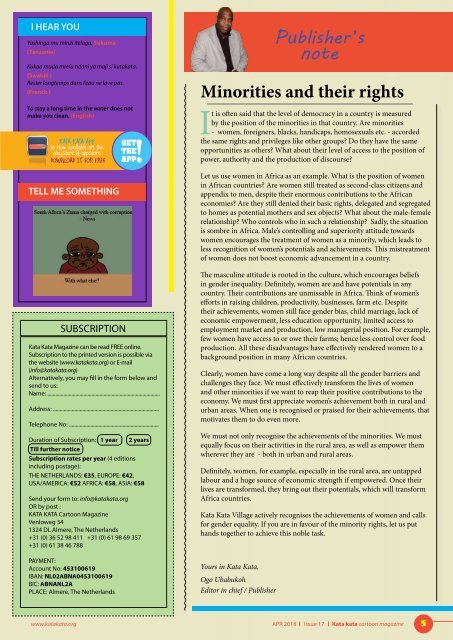2018 Edition Vol.5 Issue 17 DIGITAL
You also want an ePaper? Increase the reach of your titles
YUMPU automatically turns print PDFs into web optimized ePapers that Google loves.
I HEAR YOU<br />
Yashinga mu minzi itelaga. Sukuma<br />
(Tanzania)<br />
Kukaa muda mrefu ndani ya maji si kutakata.<br />
(Swahili )<br />
Rester longtemps dans l’eau ne lave pas.<br />
(French )<br />
To stay a long time in the water does not<br />
make you clean. (English)<br />
TELL ME SOMETHING<br />
SUBSCRIPTION<br />
Kata Kata Magazine can be read FREE online.<br />
Subscription to the printed version is possible via<br />
the website (www.katakata.org) or E-mail<br />
(info@katakata.org)<br />
Alternatively, you may fill in the form below and<br />
send to us:<br />
Name: ....................................................................................<br />
Address: ...............................................................................<br />
Telephone No: ...................................................................<br />
Duration of Subscription: 1 year 2 years<br />
Till further notice<br />
Subscription rates per year (4 editions<br />
including postage):<br />
THE NETHERLANDS: €35, EUROPE: €42,<br />
USA/AMERICA: €52 AFRICA: €58, ASIA: €58<br />
Send your form to: info@katakata.org<br />
OR by post :<br />
KATA KATA Cartoon Magazine<br />
Venloweg 34<br />
1324 DL Almere, The Netherlands<br />
+31 (0) 36 52 98 411 +31 (0) 61 98 69 357<br />
+31 (0) 61 38 46 788<br />
PAYMENT:<br />
Account No: 453100619<br />
IBAN: NL02ABNA0453100619<br />
BIC: ABNANL2A<br />
PLACE: Almere, The Netherlands<br />
Publisher’s<br />
note<br />
Minorities and their rights<br />
It is often said that the level of democracy in a country is measured<br />
by the position of the minorities in that country. Are minorities<br />
- women, foreigners, blacks, handicaps, homosexuals etc. - accorded<br />
the same rights and privileges like other groups? Do they have the same<br />
opportunities as others? What about their level of access to the position of<br />
power, authority and the production of discourse?<br />
Let us use women in Africa as an example. What is the position of women<br />
in African countries? Are women still treated as second-class citizens and<br />
appendix to men, despite their enormous contributions to the African<br />
economies? Are they still denied their basic rights, delegated and segregated<br />
to homes as potential mothers and sex objects? What about the male-female<br />
relationship? Who controls who in such a relationship? Sadly, the situation<br />
is sombre in Africa. Male’s controlling and superiority attitude towards<br />
women encourages the treatment of women as a minority, which leads to<br />
less recognition of women’s potentials and achievements. This mistreatment<br />
of women does not boost economic advancement in a country.<br />
The masculine attitude is rooted in the culture, which encourages beliefs<br />
in gender inequality. Definitely, women are and have potentials in any<br />
country. Their contributions are unmissable in Africa. Think of women’s<br />
efforts in raising children, productivity, businesses, farm etc. Despite<br />
their achievements, women still face gender bias, child marriage, lack of<br />
economic empowerment, less education opportunity, limited access to<br />
employment market and production, low managerial position. For example,<br />
few women have access to or owe their farms; hence less control over food<br />
production. All these disadvantages have effectively rendered women to a<br />
background position in many African countries.<br />
Clearly, women have come a long way despite all the gender barriers and<br />
challenges they face. We must effectively transform the lives of women<br />
and other minorities if we want to reap their positive contributions to the<br />
economy. We must first appreciate women’s achievement both in rural and<br />
urban areas. When one is recognised or praised for their achievements, that<br />
motivates them to do even more.<br />
We must not only recognise the achievements of the minorities. We must<br />
equally focus on their activities in the rural area, as well as empower them<br />
wherever they are - both in urban and rural areas.<br />
Definitely, women, for example, especially in the rural area, are untapped<br />
labour and a huge source of economic strength if empowered. Once their<br />
lives are transformed, they bring out their potentials, which will transform<br />
Africa countries.<br />
Kata Kata Village actively recognises the achievements of women and calls<br />
for gender equality. If you are in favour of the minority rights, let us put<br />
hands together to achieve this noble task.<br />
Yours in Kata Kata,<br />
Ogo Ubabukoh<br />
Editor in chief / Publisher<br />
www.katakata.org<br />
APR <strong>2018</strong> <strong>Issue</strong> <strong>17</strong> Kata kata cartoon magazine<br />
5

















